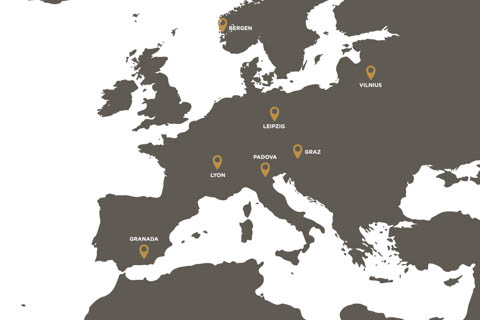Medicine
|
|
Faculty
Faculty of Medicine
|
|
|
Scope of studies and length
360 ECTS credits, 6 years
|
|
|
Qualification awarded
Master of Health Sciences, Professional Qualification of a Medical Doctor
|
|
|
Application deadline*
1 May / 1 July
|
|
|
Language
English
|
|
|
Tuition fee per year1
14 100 €
Entrance examination fee (non-refundable)
200 €
|
|
|
Start of studies
1 September
|
|
|
City
Vilnius
|
The holder of a professional qualification as a doctor possesses: adequate knowledge of the sciences on which medicine is based and a good understanding of the scientific methods; a sufficient understanding of the structure, functions and behaviour of healthy and sick persons, as well as the relations between the state of health and the physical and social surroundings of a human being; and an adequate knowledge of the clinical disciplines and practices.
Programme structure
Please note that certain changes in programme are possible.
| Subjects of study | Credits |
|---|---|
| Semester 1 Autumn | |
| Compulsory Courses | 30.0 |
| Human Anatomy I/II p. | 10.0 |
| Human Biology | 3.0 |
| Human Histology I/II p. | 5.0 |
| Introduction to Medical Studies | 3.0 |
| Latin and Professional Language | 4.0 |
| Psychology, Basics of Professional Communication and Psychosomatics | 5.0 |
| Semester 2 Spring | |
| Compulsory Courses | 25.0 |
| Biochemistry | 5.0 |
| Formation of Nursing Practical Skills | 5.0 |
| Human Anatomy II/II p. | 5.0 |
| Human Histology II/II p. | 5.0 |
| Human Physiology I/II p. | 5.0 |
| Course unit (module) of Individual Studies | 5.0 |
| Semester 3 Autumn | |
| Compulsory Courses | 30.0 |
| General Microbiology and Immunology | 5.0 |
| Human Genetics | 2.0 |
| Human Physiology II/II p. | 5.0 |
| Pathology I/II p. | 5.0 |
| Pharmacology I/II p. | 5.0 |
| Propaedeutics of Internal Diseases I/II p. | 3.0 |
| Public Health and Health Management | 5.0 |
| Semester 4 Spring | |
| Compulsory Courses | 25.0 |
| Applied Anatomy, Fundamentals of Radiology | 5.0 |
| Introduction to Research in Medicine and Evidence-based Medicine | 3.0 |
| Medical Microbiology | 5.0 |
| Pathology II/II p. | 5.0 |
| Pharmacology II/II p. | 5.0 |
| Propaedeutics of Internal Diseases II/II p. | 2.0 |
| Course unit (module) of Individual Studies | 5.0 |
| Semester 5 Autumn | |
| Compulsory Courses | 30.0 |
| Abdominal Surgery | 5.0 |
| Anesthesiology and Reanimatology; General Surgery | 5.0 |
| General Pediatrics and Neonatology | 5.0 |
| Infectious Diseases and Dermatovenerology I/II p. | 5.0 |
| Pulmonology | 5.0 |
| Radiology | 5.0 |
| Semester 6 Spring | |
| Compulsory Courses | 30.0 |
| Cardiology | 7.0 |
| Children's Diseases I/II p. | 5.0 |
| Gastroenterology | 5.0 |
| Infectious Diseases and Dermatovenerology II/II p. | 4.0 |
| Ophtalmology | 4.0 |
| Pediatric Surgery | 2.0 |
| Pulmonology, Allergology and Clinical Immunology, Tuberculosis | 3.0 |
| Semester 7 Autumn | |
| Compulsory Courses | 30.0 |
| Children's Diseases II/II p. | 5.0 |
| Laboratory Medicine | 5.0 |
| Neurology and Neurosurgery I/II p. | 5.0 |
| Obstetrics | 5.0 |
| Rheumatology, Adult and Pediatric Orthopaedics and Traumatology, Plastic Reconstructive Surgery | 10.0 |
| Semester 8 Spring | |
| Compulsory Courses | 25.0 |
| Clinical Practice | 5.0 |
| Ear, Nose and Throat Diseases | 5.0 |
| Final Master's Degree Work I/III p. | 5.0 |
| Gynecology | 5.0 |
| Neurology and Neurosurgery II/II p. | 5.0 |
| Course unit (module) of Individual Studies | 5.0 |
| Semester 9 Autumn | |
| Compulsory Courses | 30.0 |
| Clinical Genetics and Bioinformatics | 5.0 |
| Emergency Medicine | 2.0 |
| Endocrinology and Endocrine Surgery | 4.0 |
| Hematology and Clinical Oncology | 5.0 |
| Medical Law. Medical Ethics | 4.0 |
| Nephrology and Urology | 5.0 |
| Specialized Surgery (Cardio/ Thoracic/ Vascular surgery) | 5.0 |
| Semester 10 Spring | |
| Compulsory Courses | 30.0 |
| Clinical Pharmacology | 3.0 |
| Critical Care Medicine, Clinical Toxicology | 5.0 |
| Forensic Medicine | 2.0 |
| Internal Medicine, Family medicine and Gerontology | 8.0 |
| Physical Medicine & Rehabilitation | 2.0 |
| Psychiatry, Child and Adolescent Psychiatry, Psychotherapy | 10.0 |
| Semester 11 Autumn | |
| Compulsory Courses | 30.0 |
| Final Master's Degree Work II/III p. | 5.0 |
| Internship I/II p. | 25.0 |
| Semester 12 Spring | |
| Compulsory Courses | 30.0 |
| Final Examination | 5.0 |
| Internship II/II p. | 20.0 |
| Master Final Thesis (Study field: Medicine) III/III p. | 5.0 |
In the first 2 years, basic medical science is taught as a series of courses organised into four concurrent themes: molecular/cellular aspects of medicine; human structure and functions; healthcare in the community; and early clinical and professional development. The integration of science and clinical practice starts at the beginning of the courses. Through a series of lectures, seminars and visits to general practices and hospitals, you will become familiar with patient contact and learn the principles of taking the clinical history and examinations. Student-selected components allow for the study of specific topics in depth. Following this, you will move into the clinical phase, where you will rotate through a series of placements at major teaching trusts throughout the region and community.
*There are three State Graduation Exams for the Medicine study programme: Surgery; Internal Medicine; and Women and Children’s Diseases.
Key Learning Outcomes
A Medical Doctor possesses skills in using the main clinical methods, including taking and writing a detailed medical case history, performing a physical examination and an assessment of the patient’s mental status, interpreting a patient’s case history results, performing physical, laboratory and instrumental examinations, identifying a patient’s problems, and determining a preliminary diagnosis, assessment and treatment plan. He/she also possesses the main clinical skills including those relating to basic and advanced life support, venous punctures, as well as scientific research, communication, professional ethics and informational technology skills.
Specific Programme Requirements
The applicants must satisfy the following requirements to be considered for admission:
-
The applicant must take an entrance examination. The examination is conducted online on the following dates:
-
January 22, 2026 14:00 (EET, UTC+2)
-
February 26, 2026 14:00 (EET, UTC+2)
-
March 19, 2026 14:00 (EET, UTC+2)
-
April 16, 2026 14:00 (EET, UTC+3)
-
May 14, 2026 14:00 (EET, UTC +3)
-
June 18, 2026 14:00 (EET, UTC+3)
-
July 16, 2026 14:00 (EET, UTC +3)
-
IMPORTANT! Non-EU citizens must take the entrance exam no later than May 14, 2026 14:00 (EET, UTC +3).
An applicant must register for the examination and choose a suitable date. The registration form is available here. You will find further information regarding the examination here. An applicant can take an examination only once per one application period.
-
Entrance examination fee: 200 EUR. IMPORTANT! Entrance examination fee must be paid at least 48h prior to the examination time and is not refundable!
-
If the applicant has passed the following examinations no earlier than during the 2nd year before admission, the applicant may apply without taking the entrance examination, but must submit the results of one of the following tests (the results of tests remain valid for 2 years).
- If the applicant has one of the following school qualifications he/she may apply without taking the entrance examination:
-
Applicants must have completed the Biology subject at school. The Natural Sciences subject is considered to be equivalent to the Biology subject. The entrance examination is mandatory.
-
If the applicant has graduated in Biomedicine/Life Sciences/Health Sciences and has a diploma, he/she may have completed either the Biology or Chemistry/Physics subject at school. However, it is mandatory to provide documents about the education acquired in the field of Biomedicine/Life Sciences/Health Sciences. In such a case, MF will assess whether the applicant must additionally pass the entrance examination.
-
If the applicant has completed Chemistry, Physics or Mathematics subjects, it shall be considered to be an advantage.
-
Due to the differences in the education systems of different countries, the University reserves the right to individually assess the suitability of an applicant for the study programme if he/she does not meet all of the listed criteria.
-
You will have an opportunity to study and learn basic Lithuanian language (B1). The course will be free of additional charge and integrated into your daily schedule. You will gradually reach B1 level throughout 6 consecutive semesters until your clinical courses start. Basic Lithuanian language knowledge is obligatory for clinical courses and final year internship (in case internship is conducted in Lithuania). Knowing basic language would facilitate and deepen your learning experience and help in the development and formation of medical skills.
-
Lithuanian language will also be required when obtaining MD license. Obtaining MD license in Lithuania would facilitate this process in any other country of your choice.
-
Alternatively, a student can submit a nationally acknowledged certificate proving B1 level in Lithuanian language, such tests are offered by National Agency for Education.
-
An applicant who is a Lithuanian citizen can apply for programmes taught in English, however, if admitted he/she will be required to continue the studies in English track until graduation with no possibility to transfer to a similar programme taught in Lithuanian. If an applicant is interested in programmes taught in Lithuanian language, he/she must apply via LAMA BPO platform.
In addition, all applicants have to fulfil the general admission requirements.
For Transferring Students
For further information regarding the possibility to transfer to Medicine/Dentistry study programmes please visit VU MF website.
Why choose this programme?
|
What comes after?A graduate can be awarded access to the third cycle of (residency) studies. A graduate can be employed in commercial structures dealing with medical equipment or pharmaceutical companies. |
1Citizens of the Kingdom of Norway and the Kingdom of Sweden who apply to Medicine and Dentistry study programmes are subject to a non-refundable deposit of EUR 1000, which is part of the tuition fee.


